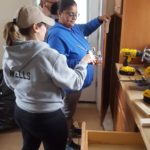Habitat doesn’t just build new homes; we also renovate houses that are old, damaged or in disrepair.

There is, of course, a degree of uncertainty with renos. “We start with inspection of the property. It’s kind of like a forensic thing… looking for sources of cracks, assessing the state of the house and finding various problems that would need to be fixed,” said our Director of Construction, Jim Eberly.
Jim also spends time talking with the future homeowner to understand what a typical day is like, so the renovations fit the family’s needs and lifestyle. In the case of Enid, future Habitat homebuyer of a renovated home on Lehman Street in Lebanon, the renovations needed to accommodate her mother, who has physical disabilities.
Our team of construction volunteers made updates that would allow Enid’s mom to live comfortably in the home: doors were widened to fit a wheelchair; a first-floor room was converted into an accessible bedroom; a chair lift was installed to allow access to the second floor; and a ramp was added to the back entrance of the home.
“We lowered switches so her mom could reach them from a wheelchair… and lowered the rods in the closet to make them more accessible,” shared Jim. “Everyday stuff we take for granted is a difficult process for someone with physical disabilities.”
There are other far-reaching benefits to renovating homes. Renovation brings new life to city blocks, revitalizes neighborhoods and builds stronger communities. “Fixing up a home is always a great option when you have existing housing stock and limited land for building,” said Andrew Szalay, Habitat’s Executive Director. “It’s cost-effective and you can also preserve history and charm.”
Enid’s sweat equity hours are complete and she has enjoyed being able to work on the house that will soon be her home. “I’m proud to do the work in my own home and learn from Jim,” said Enid with a smile. Enid’s Lehman Street home is slated for dedication this fall. We hope you’ll be able to join us—we’ll be smiling too!

